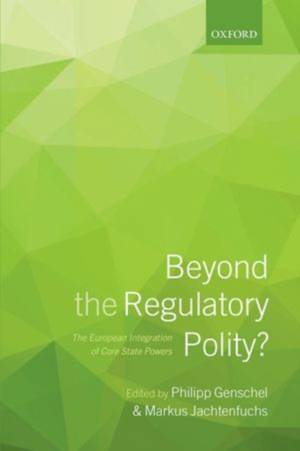
Door een staking bij bpost kan je online bestelling op dit moment iets langer onderweg zijn dan voorzien. Dringend iets nodig? Onze winkels ontvangen jou met open armen!
- Afhalen na 1 uur in een winkel met voorraad
- Gratis thuislevering in België vanaf € 30
- Ruim aanbod met 7 miljoen producten
Door een staking bij bpost kan je online bestelling op dit moment iets langer onderweg zijn dan voorzien. Dringend iets nodig? Onze winkels ontvangen jou met open armen!
- Afhalen na 1 uur in een winkel met voorraad
- Gratis thuislevering in België vanaf € 30
- Ruim aanbod met 7 miljoen producten
Zoeken
Beyond the Regulatory Polity?
The European Integration of Core State Powers
Philipp Genschel, Markus Jachtenfuchs
Hardcover | Engels
€ 160,45
+ 320 punten
Omschrijving
Most EU-scholars conceive of the EU as a multilevel polity with strong powers to regulate economic policy externalities among the member states but little power to intervene in, let alone assume, core functions of sovereign government ('core state powers') such as foreign and defense policy, public finance, public administration, and the maintenance of law and order. This book challenges this view. Based on a systematic comparison of integration processes in military security, fiscal policy, and public administration, it finds steady progress in the integration of core state powers although with substantial sectoral variation. But the EU is not heading towards state-building. In contrast to the historical experience of national federations, the European integration of core state powers proceeds mostly by regulating national capacities, not by creating European ones, and leads to territorial fragmentation rather than increased cohesiveness.
Specificaties
Betrokkenen
- Auteur(s):
- Uitgeverij:
Inhoud
- Aantal bladzijden:
- 304
- Taal:
- Engels
Eigenschappen
- Productcode (EAN):
- 9780199662821
- Verschijningsdatum:
- 12/02/2014
- Uitvoering:
- Hardcover
- Formaat:
- Genaaid
- Afmetingen:
- 160 mm x 239 mm
- Gewicht:
- 603 g

Alleen bij Standaard Boekhandel
+ 320 punten op je klantenkaart van Standaard Boekhandel
Beoordelingen
We publiceren alleen reviews die voldoen aan de voorwaarden voor reviews. Bekijk onze voorwaarden voor reviews.











